Rainbow Light Women’s One Reviews 2024: Is This Multivitamin Safe?
All articles are produced independently. When you click our links for purchasing products, we earn an affiliate commission. Learn more about how we earn revenue by reading our advertise disclaimer.
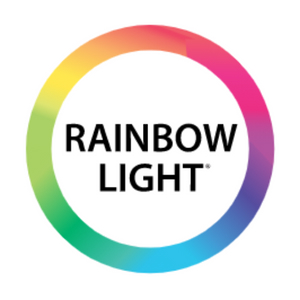
8.0
Quality
6.0
Brand’s Transparency
7.0
Value
Features
- Vegetarian tablet with 23 nutrients.
- Clinically proven absorption of vitamin D, B2, B5, folate, calcium, iron, and zinc.
- Includes a blend of superfoods, probiotics, and digestive enzymes.
- No tree nuts, peanuts, eggs, fish, shellfish, colors, flavors, or sweeteners.
- Verified Non-GMO.
- Certified as RAW and CLEAN
Brand Information
- Holistic wellness brand.
- Founded in California in 1981.
- Non-GMO.
- Certified R.A.W and C.L.E.A.N.
- Eco-friendly packaging.
Medical Benefits
- Supports immune and hormonal systems.
- Strengthens bone health.
- Promotes gut and mental wellness.
- May increase overall energy levels.
About The Brand
Rainbow Light was founded in 1981 in California as a holistic wellness supplement company. They focus on using potent vegetarian ingredients and aim to create all-natural supplements. It carries the RAW, which means it has been certified by a holistic company as using non-genetically modified organisms or non-GMO. It also uses whole, minimally processed, and highly bio-available ingredients.
Their products also carry the certified CLEAN label, which means it uses ethical, safe, mostly organic, and nourishing ingredients combining the official standards of all major certifying entities such as the United States Department of Agriculture Organic and others. On top of their ingredient focus, Rainbow Light also uses ecological packaging and supports a charity called Vitamin Angels to provide deficient at-risk women and children with supplements.
How Does Rainbow Light Women’s One Work?
Rainbow Light Women’s One Multivitamin uses a blend of vitamins, minerals, probiotics, and superfoods to promote total body health. They specifically chose seven nutrients that have been clinically proven as highly absorbent nutrients.
These clinically proven nutrients include vitamin D and zinc, supporting immune and hormonal health, and B2 and B5 for increased energy and brain functioning. Folate is another essential nutrient, especially for women of childbearing age, and it reduces the risk of congenital disabilities. Its calcium and magnesium also aid the maintenance and building of strong bones. Finally, iron is included, which aids in red blood cell formation, energy level, and immune health.
Rainbow Light Women’s One Multivitamin adds a blend of organic fruits and vegetables, including spirulina, beetroot, kale, broccoli, and more. These foods are high in antioxidants and can help to decrease inflammation. Their vitality blend has organic chlorella.
Finally, their digestive support includes ginger, digestive enzymes, and probiotics. Ginger has long been shown to aid inflammation and calm intestinal distress. Digestive enzymes may be beneficial for women with difficulty digesting certain foods, such as lactose. Probiotics are also essential for gut health and immune status, making this a great addition. However, there is only one strain of Bacillus coagulans, so an additional probiotic may be needed for women with digestive or mental wellness concerns.
Top Bestseller Products Of The Rainbow Light Brand In (May. 2024)
- Women’s One Multivitamin – Editor’s Choice
- Women’s One 50+ Multivitamin – Best Price
Pros
- Vegetarian or vegan products and non-GMO.
- Certified C.L.E.A.N and R.A.W ingredients.
- Uses Good Manufacturing Practices or GMP
- Eco Guard® bottles are made from 100% recycled plastic.
- Partner of Vitamin Angels.
- Discounts on their website for first-time buyers.
- 60-day money-back guarantee.
- Free shipping.
Cons
- Some nutrients are excessive.
- Reports of intestinal distress, rashes, and headaches. Complaints of pill sizes and taste.
- Potentially dangerous high levels of vitamin A, D, B1, B2, B5, B6, B12.
- Class action lawsuit in 2020.
Best Seller Rainbow Light Women’s One Products 2024
Women’s One Multivitamin

Overall, Rainbow Light Women’s One Multivitamin is likely to provide malnourished women with their daily vitamin and mineral needs.
- Boasts 23 vitamins and minerals.
- Contains superfoods, probiotics, and digestive enzymes.
- Certified R.A.W and C.L.E.A.N ingredients.
- Helpful for women deficient in vitamin D, B vitamins, and iron.
- Contains milk, soy, and wheat traces.
- Contains 200% of the DV for vitamin A and 417% DV for B12.
- Large pill, which may be difficult to swallow.
With clinically proven absorption of some of the most commonly deficient vitamins and minerals, Rainbow Light Women’s One Multivitamin reviews show this supplement can fill most women’s nutritional needs. It offers 100% DV or greater of folate, vitamins E, K, A, and many minerals such as zinc, selenium, iodine, copper, and chromium.
Rainbow Light’s Women’s One Multivitamin’s potent nutrients, along with its digestive and antioxidant support blends, make it a great addition for women looking for an all-in-one type of supplement. However, for those with stomach sensitivities, this brand may cause some intestinal side effects and skin issues (acne, rashes, niacin flush) or headaches.
This multivitamin contains 200% of the DV for vitamin A,[1] a fat-soluble vitamin stored in the fatty tissues of the body, which may build up to a significantly toxic dose over time. It also contains 417% of the DV for vitamin B12 and over 200% of several B vitamins, which can have minor and reversible negative side effects at this dosage.
Finally, there was a class action lawsuit in 2020 against Rainbow Light alleging high amounts of heavy metals and that their third-party testing made misleading claims, which was resolved for 6.75 million.
Women’s One 50+ Multivitamin
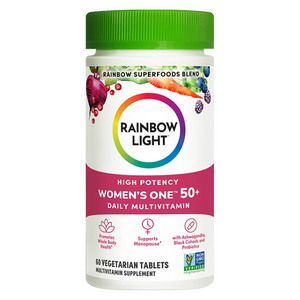
Women’s One 50+ Multivitamin can provide essential nutrients to women, with over 18 of their products offering 100% or more of the daily recommended value.
- Full spectrum of 23 vitamins and minerals.
- Targets heart, brain, and immune health.
- Added black cohosh for possible menopausal support.
- Contains a blend of organic superfoods and probiotics.
- Unpleasant smell and taste.
- May cause nausea and digestive distress.
- May cause headaches, migraines, and sleep disturbances.
Rainbow Light Women’s One 50+ Multivitamin promotes healthy brain, bone, immune, and hormonal functioning. It has very high amounts of B vitamins, vitamin D, and minerals such as zinc, copper, and manganese. It also focuses on menopausal support by adding black cohosh,[2] an herb that may help to reduce menopause symptoms.
The botanical blend also adds ginkgo,[3] ashwagandha,[4] and chlorella.[5] These botanicals are still in the early stages of clinical research and cannot be confirmed as helpful, but current evidence shows promising anti-inflammatory and energy-boosting results due to their high antioxidant content.
For a digestive aid, they’ve added ginger,[6] bromelain,[7] and papain,[8] which have been shown to help relieve dyspepsia and pain in the back and joints while relieving inflammation. Finally, they also include a blend of organic superfoods that may add antioxidants and energy support.
Unfortunately, they only have one strain of probiotics, which may not be enough for women with certain mental health, digestive, and gut issues. There are also many complaints of side effects, such as headaches, exhaustion, and digestive issues. It has very high amounts of many of the B vitamins,[9] which can be dangerous.
What Do We Like About Rainbow Light Women’s One?
Rainbow Light Women’s One Multivitamin uses seven clinically proven nutrients that boost immune, hormonal, bone, and brain health. These include vitamin D, B2, B5, folate, calcium, iron, and zinc.
Their products include a blend of organic superfoods, spirulina, beetroot, broccoli, kale, spinach, blackberry, blueberry, carrot, and cranberry. These are all high in antioxidants and helpful in reducing inflammation and the risk of certain diseases and cancers. However, these elements are proprietary blends, and there is no way of telling if doses are present in effective ranges.
Another benefit to these multivitamins is that they’ve added digestive enzymes and probiotics to aid gut health. A healthy gut microbiome is essential for immune and brain health,[10] helping to decrease illnesses and symptoms of anxiety and depression while boosting immunities.
Finally, there’s also the addition of citrus flavonoids[11] in the women’s multivitamins, which are antioxidants, and inositol, a sugar affecting insulin responses. Inositol is found in fruits and may help treat mood[12] and metabolic disorders.[13]
This supplement offers many more benefits than solely vitamins and minerals. Overall, Rainbow Light Women’s One products are a total body all-in-one health supplement for women.
Essential Vitamins And Minerals For Women
In general, the recommended amount of essential vitamins and minerals can be met by eating a healthy diet[14] balanced in macro and micronutrients. However, there are a few nutrients that, depending on if you’re vegetarian, vegan, or eating only a few whole foods, would be difficult to meet. These include vitamin D, B vitamins, calcium, and iron.
Vitamin D
One of the most prevalent vitamin deficiencies in the world is vitamin D. While it’s called the sunshine vitamin, it’s difficult to get enough of it even if you live in a sunny climate. The current recommended amount for adults is 600 International Units,[15] which isn’t very difficult to obtain if you consume mostly whole foods and milk products. Good food sources include salmon, eggs, milk, yogurt, and fortified cereals or drinks.
Vegetarians, vegans, and people eating processed foods, however, may easily find themselves deficient in D since it’s mostly found in animal products. On top of that, research shows that the previously recommended 600 IU may not be enough. Studies now claim that 1,000 IU[16] is a more appropriate amount for immune and hormonal health.
Folate Or Folic Acid
You’ll find folate in almost every multivitamin for women since it reduces the risk of birth defects. A woman needs adequate amounts already in her system before conception to avoid neural tube defects. This is why most governments fortify foods with B vitamins and insist on their inclusion in multivitamins. Fortunately, it’s also found in many foods, such as green vegetables, chickpeas, and kidney beans. An adequate amount, 400 micrograms,[17] can often be met through a healthy diet alone.
Vitamin B12
Along with folate and iron, vitamin B12[18] helps form red blood cells and releases energy to the body from food. Deficiencies are common and can lead to lethargy, depression, and heart disease.
Adult women need about 1.5 mcg[19] per day, which can be difficult to get without a whole-food, non-vegan diet. Food sources include eggs, milk, cheese, fish, and meat.
Iron
Iron is found in most multivitamins since women can easily become anemic without adequate amounts. Iron helps to make red blood cells and carry oxygen throughout the body, helping to keep you energized and hormonally balanced. Without enough, you may constantly feel tired and have dry skin, irregular periods, and headaches. Women need about 14.8 milligrams per day,[20] which can be obtained through beans, nuts, dried fruit, fortified cereals, or red meat.
Calcium And Magnesium
Calcium and magnesium, along with vitamin D and K2, help build strong bones and prevent bone decay later in life. They also help blood flow, digestion, and nerve and muscle function. For this reason, you’ll often find these two in most multivitamins.
Calcium can be difficult to get enough of if you’re vegetarian or vegan since most Americans get their recommended amounts through dairy. Some of the best food sources are yogurt, milk, and cheese, but it is also found in kale, broccoli, spinach, and fortified drinks or cereals. The average adult woman needs about 700 mg per day,[21] which most people can get from food alone.
Dosage
Rainbow Light recommends taking one tablet with or in between meals. However, multivitamins are often better tolerated and cause less digestive distress when taken with meals. Many people experience stomach pain, nausea, headaches, and diarrhea when taken on an empty stomach.
Another reason food is so helpful is that it signals the body to begin digesting, which helps the body absorb certain nutrients better. It’s especially the case for fat-soluble vitamins that need fat to be taken into the cells.
Without food and with excessively high dosages of certain vitamins and minerals, you may also notice your urine become very bright and yellow after taking supplements. For these reasons, it’s recommended to take vitamins with food unless otherwise directed by your medical professional.
Alternatives To Rainbow Light Women’s One
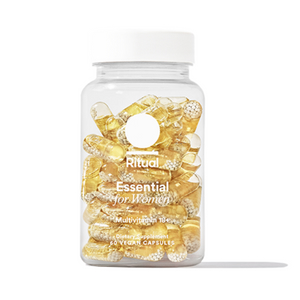
Ritual Multivitamin For Women
- Delayed release capsule.
- Gluten and major allergy free.
- Properly proportioned nutrients with a less is more approach.
- More expensive than other brands.
- Reports of headaches, acne, anxiety, and intestinal distress.
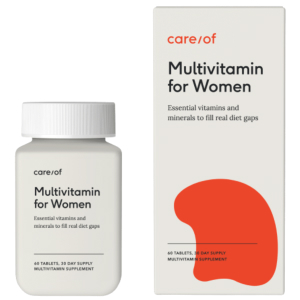
Care/of Multivitamin
- Only contains most commonly missed nutrients to avoid toxicity.
- Vegetarian, major allergy-free, gluten-free, and certified C.L.E.A.N.
- Third-party tested.
- Requires two supplements per day.
- Has no folate or iron.
- Contains maltodextrin.
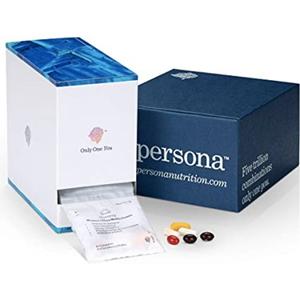
Persona Women’s Essentials
- Online health assessment for personalized nutrients.
- Free nutrition consultation.
- High-quality ingredients, vegan, and free of major allergens.
- Not third-party tested.
- The exact amounts of nutrients are unknown.
Final Thought
Rainbow Light Women’s One Multivitamin is a total body health supplement tailored for women under and over 50. It focuses on immune, brain, bone, and hormonal health with added probiotics and antioxidant blends. For women deficient in any nutrients, this supplement should help to fill the gaps.
However, there are a few reports of side effects, such as intestinal distress, headaches, and rashes. It’s important to watch for symptoms within the first few days and weeks of taking this supplement and discontinue if symptoms are noted.
Be sure to speak to your doctor before taking any new supplement to be sure it’s right for you.
Frequently Asked Questions
Technically, yes. It’s safe to take a multivitamin on an empty stomach. However, if you sometimes experience gastrointestinal distress after taking medication or vitamins, it’s a sign that you should take it with food. Food can also help your body absorb nutrients better, so it’s recommended to take it with food.
Yes. You may experience symptoms[22] of stomach discomfort or pain, nausea or vomiting, gas, constipation, headaches, diarrhea, an unpleasant taste in the mouth, loss of appetite, or heartburn.
It depends on your regular diet and if you have any nutritional deficiencies. For most of the population, you likely don’t need to take a daily multivitamin.[14] Even taking it a few days a week can offer similar benefits as taking it daily. This is because many vitamins are fat soluble, and many brands offer more than 100% of your daily value for various nutrients. It’s also important to remember that daily multivitamins can have side effects and cause toxicity if the doses are especially high.
A 50-year-old woman has an increased need for vitamin D and bone-supporting nutrients.[23] They should take either a multivitamin or a bone-promoting supplement with vitamin D3, K2, magnesium, and calcium.
+ 23 sources
Health Canal avoids using tertiary references. We have strict sourcing guidelines and rely on peer-reviewed studies, academic researches from medical associations and institutions. To ensure the accuracy of articles in Health Canal, you can read more about the editorial process here
- Rogovik, A.L. (2016). Safety Considerations and Potential Interactions of Vitamins: Should Vitamins Be Considered Drugs? – Alexander L Rogovik, Sunita Vohra, Ran D Goldman, 2010. [online] Annals of Pharmacotherapy. Available at: https://journals.sagepub.com/doi/abs/10.1345/aph.1M238
- BORRELLI, F. and ERNST, E. (2008). Black cohosh (Cimicifuga racemosa) for menopausal symptoms: A systematic review of its efficacy. Pharmacological Research, [online] 58(1), pp.8–14. doi:https://doi.org/10.1016/j.phrs.2008.05.008.
- SIERPINA, V.S., BERND WOLLSCHLAEGER and BLUMENTHAL, M. (2003). Ginkgo Biloba. American Family Physician, [online] 68(5), pp.923–926. Available at: https://www.aafp.org/pubs/afp/issues/2003/0901/p923.html
- Singh, B., Dagenais, S., Assistant, B.-R. and Mishra, L.-C. (2000). Scientific Basis for the Therapeutic Use of Withania somnifera (Ashwagandha): A Review. Alternative Medicine Review ◆, [online] 5. Available at: https://citeseerx.ist.psu.edu/document?repid=rep1&type=pdf&doi=2bdff82eb23a373885252c87b53135b2fc9adde4.
- Panahi, Y., Darvishi, B., Jowzi, N., Beiraghdar, F. and Sahebkar, A. (2016). Chlorella vulgaris: A Multifunctional Dietary Supplement with Div…: Ingenta Connect. [online] Ingentaconnect.com. Available at: https://www.ingentaconnect.com/content/ben/cpd/2016/00000022/00000002/art00006
- Moghaddasi, M. and Kashani, H. (2012). Ginger (Zingiber officinale): A review. Journal of Medicinal Plants Research, [online] 6(26), pp.4255–4258. doi:https://doi.org/10.5897/JMPR11.787.
- Bala, M., Azira, N., Mel, M., Jami, M., Salleh, H., Amid, A. and Saedi, M. (2012). Bromelain Production: Current Trends and Perspective. Archives Des Sciences, [online] 65(11), p.370. Available at: https://core.ac.uk/download/pdf/300418513.pdf.
- Bradauskiene, V., Vaiciulyte-Funk, L., Cernauskas, D., Dzingeleviciene, R., Lima, J.P.M., Bradauskaite, A. and Tita, M.A. (2022). The Efficacy of Plant Enzymes Bromelain and Papain as a Tool for Reducing Gluten Immunogenicity from Wheat Bran. Processes, [online] 10(10), p.1948. doi:https://doi.org/10.3390/pr10101948.
- Hemminger, A. and Wills, B.K. (2022). Vitamin B6 Toxicity. [online] Nih.gov. Available at: https://www.ncbi.nlm.nih.gov/books/NBK554500/
- Foster, J.A. and McVey Neufeld, K.-A. (2013). Gut–brain axis: how the microbiome influences anxiety and depression. Trends in Neurosciences, [online] 36(5), pp.305–312. doi:https://doi.org/10.1016/j.tins.2013.01.005.
- Xu, D.-P., Li, Y., Meng, X., Zhou, T., Zhou, Y., Zheng, J., Zhang, J.-J. and Li, H.-B. (2017). Natural Antioxidants in Foods and Medicinal Plants: Extraction, Assessment and Resources. International Journal of Molecular Sciences, [online] 18(1), p.96. doi:https://doi.org/10.3390/ijms18010096.
- LWW. (2023). Double-Blind, Controlled, Crossover Trial of Inositol… : Journal of Clinical Psychopharmacology. [online] Available at: https://journals.lww.com/psychopharmacology/Abstract/2001/06000/Double_Blind,_Controlled,_Crossover_Trial_of.14.aspx
- Giordano, D., Corrado, F., Santamaria, A., Quattrone, S., Pintaudi, B., Di Benedetto, A. and D’Anna, R. (2011). Effects of myo-inositol supplementation in postmenopausal women with metabolic syndrome. Menopause, [online] 18(1), pp.102–104. doi:https://doi.org/10.1097/gme.0b013e3181e8e1b1.
- Kamangar, F. and Emadi, A. (2012). Vitamin and mineral supplements: do we really need them? International journal of preventive medicine, [online] 3(3), pp.221–6. Available at: https://www.ncbi.nlm.nih.gov/pmc/articles/PMC3309636/
- NHS Choices (2023). Vitamin D – Vitamins and minerals. [online] Available at: https://www.nhs.uk/conditions/vitamins-and-minerals/vitamin-d/
- Amrein, K., Scherkl, M., Hoffmann, M., Neuwersch-Sommeregger, S., Köstenberger, M., Tmava Berisha, A., Martucci, G., Pilz, S. and Malle, O. (2020). Vitamin D deficiency 2.0: an update on the current status worldwide. European Journal of Clinical Nutrition, [online] 74(11), pp.1498–1513. doi:https://doi.org/10.1038/s41430-020-0558-y.
- NHS Choices (2023). B vitamins and folic acid – Vitamins and minerals. [online] Available at: https://www.nhs.uk/conditions/vitamins-and-minerals/vitamin-b/
- NHS Choices (2023). Overview – Vitamin B12 or folate deficiency anaemia. [online] Available at: https://www.nhs.uk/conditions/vitamin-b12-or-folate-deficiency-anaemia/
- NHS Choices (2023). B vitamins and folic acid – Vitamins and minerals. [online] Available at: https://www.nhs.uk/conditions/vitamins-and-minerals/vitamin-b/
- NHS Choices (2023). Iron – Vitamins and minerals. [online] Available at: https://www.nhs.uk/conditions/vitamins-and-minerals/iron/
- NHS Choices (2023). Calcium – Vitamins and minerals. [online] Available at: https://www.nhs.uk/conditions/vitamins-and-minerals/calcium/
- Jasti, S., Siega-Riz, A.M., Cogswell, M.E., Hartzema, A.G. and Bentley, M.E. (2005). Pill Count Adherence to Prenatal Multivitamin/Mineral Supplement Use among Low-Income Women. The Journal of Nutrition, [online] 135(5), pp.1093–1101. doi:https://doi.org/10.1093/jn/135.5.1093.
- Critical Reviews in Food Science and Nutrition. (2023). The Role of Nutrients in Bone Health, from A to Z. [online] Available at: https://www.tandfonline.com/doi/abs/10.1080/10408390500466174



